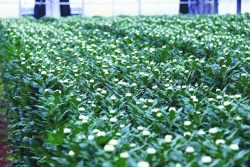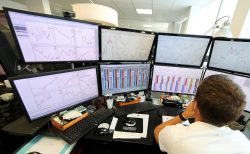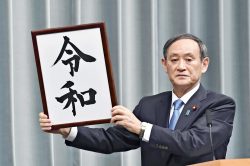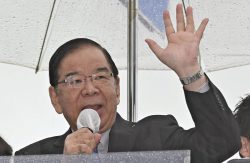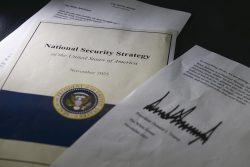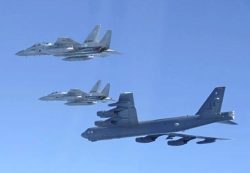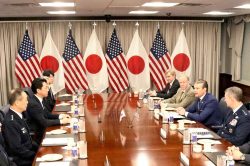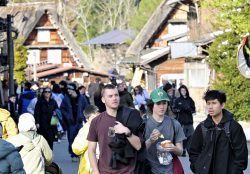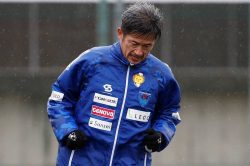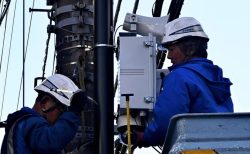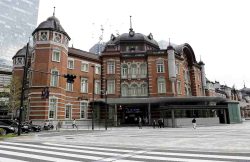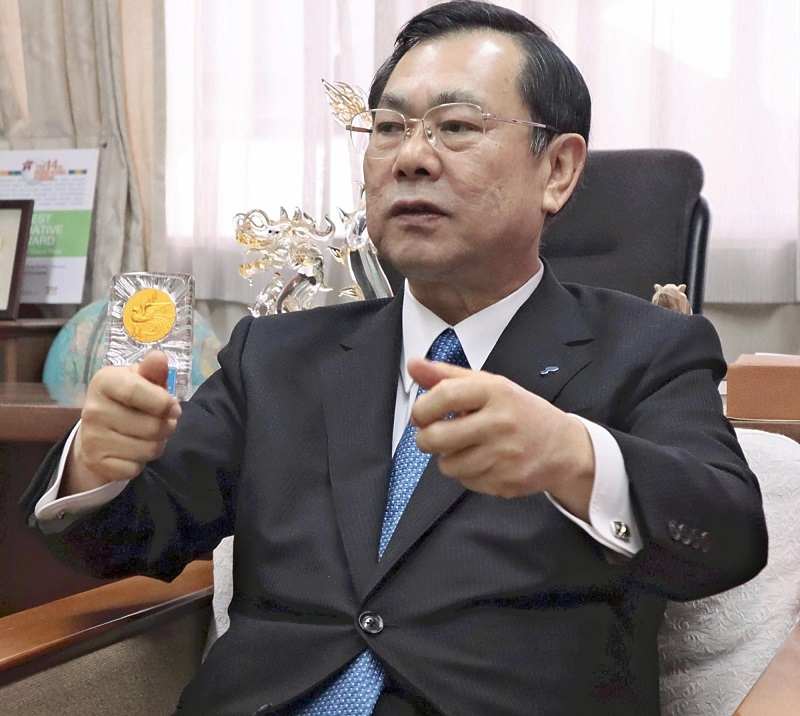
Denichiro Ishimine, head of the council of Okinawa prefectural economic organizations
10:32 JST, July 12, 2021
This is the eighth installment of a series examining Okinawa today, 50 years since Tokyo and Washington agreed on the islands’ return to Japan. In this installment, The Yomiuri Shimbun interviews Denichiro Ishimine, head of the council of Okinawa prefectural economic organizations, about the state of the Okinawa economy.
The Yomiuri Shimbun: What are key issues facing the Okinawa economy?
Denichiro Ishimine: The post-war Okinawa economy started as a military-base dependent, import-oriented economy. During the period of U.S. rule, the United States took the stance of promoting imports; as a result, manufacturing did not take root in Okinawa Prefecture, and industry grew around the tertiary sector, such as wholesalers and the service industry. The prefecture continued to run a trade deficit, which was covered by revenue associated with the U.S. military bases and financial support from the Japanese and U.S. governments.
Four systems under the Law on Special Measures for the Promotion and Development of Okinawa and other legislation were of great significance in developing social infrastructure and improving the quality of life in Okinawa after its return to Japan. Namely, 1) the preferential tax system; 2) the high assistance rate system, in which the central government provides subsidies to cover up to 90 percent of public works expenses; 3) the lump-sum grants that municipalities can spend discretionally; and 4) policy-based finance provided by the Okinawa Development Finance Corporation.
Today, Okinawa Prefecture’s social capital has reached levels comparable to mainland Japan, and the prefecture has achieved growth, mainly in the tourism, information communication technology, and logistics sectors.
However, after its return to Japan, Okinawa Prefecture has almost always ranked last out of all the prefectures in per capita income. In particular, the fragility of the financial foundations of small and mid-sized companies has stood out conspicuously. The first challenge [for Okinawa to address] would be to boost corporate earnings and build a framework that passes these earnings on to individuals in the form of increased income.
Childhood poverty has also become a pressing social issue in the prefecture. Why are children impoverished? Because their parents are poor. Why are their parents poor? For multiple reasons, such as the prevalence of single-parent households, the high ratio of nonregular employees in the workforce, and the high unemployment rates among the young generation.
To address these issues, it is important that communities provide support for their single parents and young pregnant women. In the medium and long term, it will be important to provide sustained support for children from single-parent families until they graduate from high school and university. High levels of education offer economic advantages. It will be necessary to create a system to break the cycle of poverty through these measures.
Q: Some members of the ruling Liberal Democratic Party are against simply extending the Law on Special Measures for the Promotion and Development of Okinawa, which will expire at the end of this fiscal year.
A: We are always seeking ways to become economically independent. Of course, we should aim for a prefectural economy that is not dependent on central government support. But the reality is that the prefecture has yet to achieve economic independence, even now that half a century has passed since it was returned to Japan.
I want the central government to reconsider [the legislation] to better reflect the current situation, with the caveat those four systems are, in principle, kept in place for the time being. Discontinuing those four systems at the end of this fiscal year is difficult to consider.
Okinawa is the only prefecture that has been logging a natural population increase. But forecasts show that even Okinawa’s population will eventually tip over toward decline in the future. This raises the problem of how long we will be able to sustain certain municipalities, particularly those on our small, remote islands. Measures to maintain the stable presence of residents on remote islands are also important from a national security perspective.
Q: Do you think the prefectural economy is dependent on U.S. military bases?
A: When Okinawa was returned to Japan in 1972, U.S. military base-related revenue within the prefecture amounted to ¥77.7 billion, or 15.5% of the gross prefectural income. While the prefecture’s military base-related revenues had risen to ¥245.4 billion in fiscal 2018, the Okinawa economy had also expended over the interim, and the figure represented only a 5.1% of the gross prefectural income. As such, some have said that the Okinawa economy is no longer dependent on the military bases.
At the same time, others have said that the prefecture’s access to a lopsided allotment of central government subsidies is predicated on the existence of the military bases.
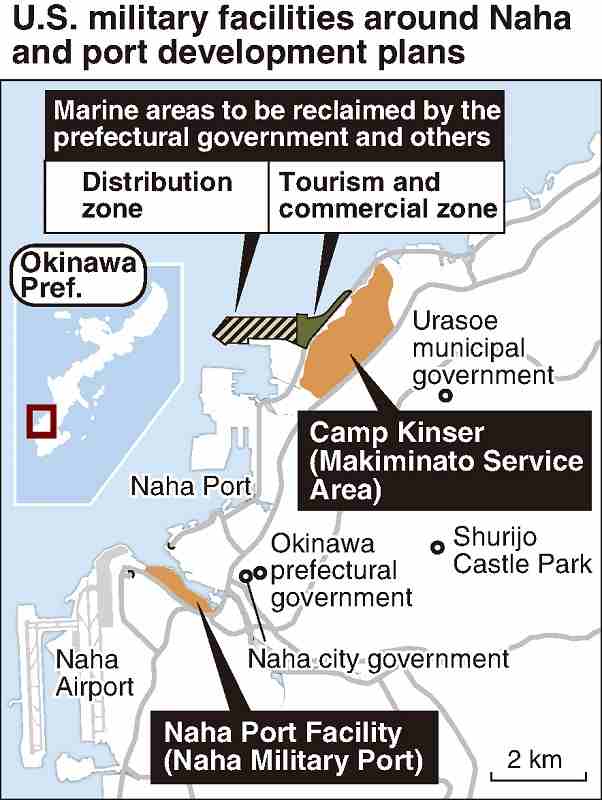
There are also various drawbacks to the U.S. military bases. They occupy prime real estate in the prefecture and can be quite noisy, to name two. Such considerations make it difficult to appraise the effects of military bases on the economy on the whole.
However, there is no doubt that the land on which the bases stand could, when returned to Japan, be used to drive the growth of the prefectural economy. For example, the areas stretching along the west coast from Camp Kinser (Makiminato Service Area) in Urasoe to the Naha Port Facility (Naha Military Port) and Naha Airport have beautiful beaches; the government and other entities already have plans for port development. Perhaps they could be developed as a fertile new nexus of tourism and commerce.

Denichiro Ishimine
Born in Naha, Ishimine graduated from the University of the Ryukyus. He joined the Okinawa Electric Power Co., where he rose to the posts of president and chairman. He currently serves as an advisor to the company. He is also the chairman of the Naha Chamber of Commerce and Industry and vice chairman of the Okinawa Prefecture promotion council, tasked with discussing new Okinawa promotion plans. He is 72 years old.
"Business" POPULAR ARTICLE
-

Japan Govt Adopts Measures to Curb Mega Solar Power Plant Projects Amid Environmental Concerns
-
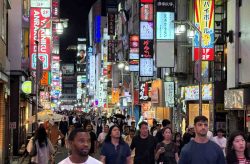
Core Inflation in Tokyo Slows in December but Stays above BOJ Target
-

Major Japan Firms’ Average Winter Bonus Tops ¥1 Mil.
-

Bank of Japan Considered U.S. Tariffs, Coming Shunto Wage Hike Talks in Its Decision to Raise Interest Rates
-
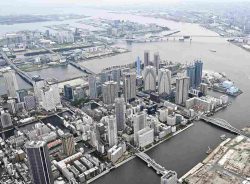
Institute: 2026 Condo Supply in Tokyo Metropolitan Area Forecast to Increase by 2.2%
JN ACCESS RANKING
-

Japan Govt Adopts Measures to Curb Mega Solar Power Plant Projects Amid Environmental Concerns
-

Core Inflation in Tokyo Slows in December but Stays above BOJ Target
-

Major Japan Firms’ Average Winter Bonus Tops ¥1 Mil.
-

Bank of Japan Considered U.S. Tariffs, Coming Shunto Wage Hike Talks in Its Decision to Raise Interest Rates
-

Tokyo Zoo Wolf Believed to Have Used Vegetation Growing on Wall to Climb, Escape; Animal Living Happily after Recapture



